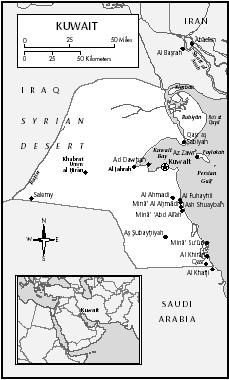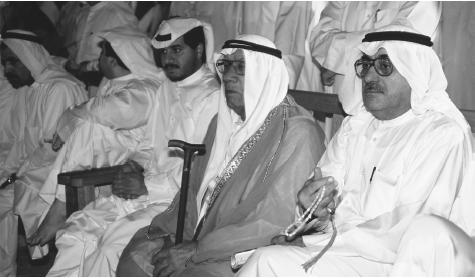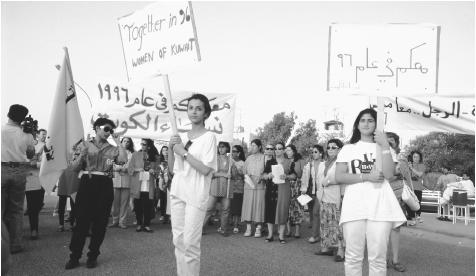Kuwait
Culture Name
Kuwaiti
Alternative Names
State of Kuwait, Dawlat al Kuwayt
Orientation
Identification. Modern day Kuwaitis are the descendants of several nomadic tribes and clans who ultimately settled on the coast of the Arabian Gulf during the eighteenth century to avoid the persistent drought of the desert. When they arrived at the coast, the clans built forts to protect themselves from other nomadic tribes who still traversed the desert. The name Kuwait is derived from kut, an Arabic word for "fort."
Location and Geography. Kuwait is a small country located in the Middle East on the Persian Gulf, between Iraq and Saudi Arabia. It is a desert country with intensely hot summers and short, cool winters. The terrain varies minimally, between flat and slightly undulating desert plains.
Demography. The population of Kuwait in 2000 was estimated at 1,973,572, including 1,159,913 non-Kuwaiti citizens. A variety of ethnic groups reside in this country, and only around 40 percent of the population is Kuwaiti. People from surrounding Middle Eastern nations, such as Egypt, Palestine, Jordan, Lebanon, Oman, Saudi Arabia, and Yemen, constitute 35 percent of the population. This make up is often in flux, depending on the dynamics and relationships between surrounding countries. After the Gulf War the entire population of Palestinians was expelled from Kuwait, because they were believed to sympathize with Iraq. In addition to these Arabian and African populations, approximately 9 percent of the population is Indian, 4 percent of the population is Iranian, and the remaining 7 percent is consists of other foreign nationals. Approximately 29 percent of the population is 14 years or under, 68 percent is between the ages of 15 and 64, and 2 percent of the population is over 65 years of age. Around 60 percent of the population is male, while 40 percent of the population is female.
Linguistic Affiliation. Arabic is the official language, and English is widely spoken.
History and Ethnic Relations
Emergence of the Nation. For centuries Kuwait was merely a transitory home for Arabic nomads. Located between Mesopotamia and the Indus river valley, this arid terrain was a trade link between these two civilizations. In the early 16th century Portuguese invaded the Arabian Gulf and built a fort where Kuwait City now stands. The Portuguese used the area as a base from which to make further excursions north, but their residence in the Arabian Desert was short-lived. Thus, up until the 18th century, Kuwait was a territory of shifting communities.
It was in 1710 that the Sabahs, a nomadic community of people of Arabian descent, settled in what is now Kuwait city. In the mid 18th century, members of the Utab clan, from what is now Saudi Arabia, began to settle in Kuwait. Within a span of fifty years, the town burgeoned into an important trading post, with boat building and the excavation and cultivation of pearls being the two main industries.
National Identity. Kuwaitis are increasingly a minority in their own country. The fear that has arisen from this loss of dominance, compounded by the country's precarious relationship with neighboring nations such as Iraq, has led to extremist policies and practices regarding the assertion of nationality and the rights of Kuwaiti nationals.
Ethnic Relations. Ethnic Kuwaitis struggle to maintain their cultural dominance in an increasingly complex society. Dominant Kuwaiti culture is homogeneous, and adheres to traditional values

Urbanism, Architecture, and the Use of Space
Over the span of just two hundred years, Kuwait shifted from a nomadic population to an urban population. The development of the urban environment has largely been influenced by Islam, and Kuwaiti homes reflect the tenets of Islam as clearly as they reflect the influence of desert life and culture. Most homes are rectangular in shape and are organized around an inner courtyard. This courtyard allows for an enclosed yet open environment, and at the same time protects from the wind and direct sunlight in the arid desert climate. Generally homes are clustered together to unite and serve the needs of an extended family. As family size increases, more rooms are built on to accommodate the new members.
The manner in which space is used in Kuwait reflects the traditional relationship between men and women. In nomadic times, tents would be separated by screens or a cloth, so that men could entertain unrelated men, as is their custom, without having the guests come into contact with female kin. With the advent of urban living, homes were built with what is known as a "double circulation system" so that men and women could avoid contact with one another, and most importantly so that women were not in contact with strange men.
Food and Economy
Food in Daily Life. After centuries of living as nomads, surviving off of subsistence farming and animal husbandry, the relatively recent increase in the income of many Kuwaitis has lead to a rapid rise in the relative obesity of the general population. Still operating under the precept that plump children are healthy, Kuwaitis eat a very rich diet, and do not engage in physical exercise like they did in the past. The shift from a nomadic to sedentary lifestyle happened quickly with industrialization and urbanization coinciding with the advent of the oil industry in the past century, and habits of nutrition have not completely changed to accommodate the present environment.
An average Kuwaiti person eats three meals each day. Breakfast often includes some meat, such as fried liver or kidneys, and a dairy product such as cheese or yogurt. For lunch and dinner, several meat dishes may be served. In the desert, vegetables and grains were largely unavailable. Subsequently, meat was a staple of the desert nomad's diet. As in the past, meat remains a central part of the Kuwaiti diet.
Food Customs at Ceremonial Occasions. For Kuwaitis, it is very important to be generous in providing food for guests. For ceremonial occasions such as weddings, people will roast an entire sheep and serve it on a bed of saffron rice.
As Kuwait is predominately an Islamic country, alcohol is illegal within its borders. Islam influences many customs regarding food, the most prominent of which is the fasting month of Ramadan. During Ramadan, practitioners of Islam fast between sunrise and sunset. Also at this time, the consumption of food, drink, and tobacco in public is forbidden.
Basic Economy. With only 5 percent of the land suitable for farming, Kuwait is dependent on international trade for the provision of most basic necessities, including food, clothing, and construction materials. However, that dependency is tempered by the fact that Kuwait is one of the largest oil producing countries in the world, an energy source upon which virtually every developed nation is dependent. Kuwait's relationship with trading partners is thus defined by the countries respective interdependence.
Land Tenure and Property. Many people live in urban areas because of the necessity of sharing scarce resources in the desert. This factor also influences the price of available property: prices are high and the general population has limited ability to actually own property.
Major Industries. The economy of Kuwait is dependent on the oil industry. During the war with Iraq many oil refining facilities were destroyed, but this industry remains of enormous importance to Kuwait. To protect oil interests, and to protect against larger countries taking advantage of Kuwait, the country was one of the founding members of the Organization of Petroleum Exporting Countries (OPEC).
Trade. Kuwait was built on the trade between Mesopotamia and the Indus river valley. Throughout its history Kuwait has depended on trade, and today exports total $13.5 billion each year in oil, refined products, and fertilizers. Japan, India, the United States, South Korea, and Singapore are the major recipients of their exports. Kuwait imports $8.1 billion a year in food, construction materials, vehicles and parts, and clothing from the United States, Japan, the United Kingdom, Germany, and Italy.
Division of Labor. The labor force includes 1.3 million people. The government and social services employ 50 percent of the labor force, businesses employ 40 percent, and the remaining 10 percent are employed in agriculture. This labor force is divided along ethnic lines, with Kuwaitis holding most of the government jobs and owning most of the of businesses in the private sector. Non-Kuwaitis generally labor in various businesses and in the oil industry.

Social Stratification
Classes and Castes. There are five levels of social stratification in Kuwaiti society, and these divisions are based on wealth. At the apex of the social hierarchy is the ruling family. Below that are old Kuwaiti merchant families. In the middle of the strata are former Bedouins, Arabian Desert nomads, who settled in Kuwait with the advent of the oil industry. Next come Arabs from neighboring countries, and at the bottom of this hierarchy are foreigners.
Within classes there are strong kinship bonds, which help maintain the social structure. Social stratification is perpetuated by the state, as in the legal ability to own property by cultural factors, such as marriage patterns, and by social rights, such as the provision or lack of state funded education, healthcare, and housing. Within this hierarchy there are enormous gaps between the vastly rich, the middle class, and the extraordinarily poor migrants.
Political Life
Government. Kuwaiti government is nominally a constitutional monarchy, headed by the Amir. The constitution was approved and implemented on 11 November 1962. Upon the development of this

Leadership and Political Officials. There are not any national political parties or leaders, yet several political groups act as de facto parties; these include the Bedouins, merchants, nationalists, Sunni and Shi'a activists, and secular leftists. These de facto parties are divided along the lines of class and religion.
Social Problems and Control. Social problems stem predominantly from the various systemic hierarchies. Within these structures, groups and individuals are constantly struggling to either improve or maintain their position. As of late, the position of women within these structures has been a subject of great debate. Similarly, the degree to which Islam should influence political structures is also a source of debate and contention. Presently, political and social controls are influenced by a combination of Islam and tradition, but this is being questioned in the increasingly multicultural environment of Kuwait.
Military Activity. Kuwait has an army, navy, and air force. The national police force, national guard, and coast guard are also part of the military. During 1999-2000, $2.5 billion (U.S.) was spent on the military.
Social Welfare and Change Programs
Social service programs have long been an important agenda item for Kuwait's government, with education and health being two of the country's major expenditures. In the past there have been many programs providing housing and subsidizing services such as water, electricity, and gasoline. Recently, however, these programs have been cut back and are being re-evaluated, as they have lead to an extreme amount of reliance on the state for basic services.
Nongovernmental Organizations and Other Associations
In the past the Kuwait Fund for Arabic Economic Development was one of the largest and most

Gender Roles and Statuses
Division of Labor by Gender. Both Kuwaiti custom and law enforce a division of labor by gender. Unlike other Arabic countries, women are involved various aspects of the labor force, but the percentage of women involved in labor outside of the home is small. Those women who are gainfully employed often work in the social services, in clerical positions, and as teachers. Few women are owners or managers of small businesses.
The Relative Status of Women and Men. The tension between traditional Kuwaiti Islamic values and Western values is evidenced in the roles and status afforded to men and women within Kuwaiti society. Many women still go veiled and wear the traditional black, but many girls in the younger generation follow the dictates of western fashion. Female students are a majority at Kuwait University, and women are prominent in the country's commercial life and in the civil service. Women are openly agitating for the relaxation of social restrictions on females, more women's rights, and an increase in job opportunities.
Marriage, Family, and Kinship
Marriage. Most marriages in Kuwait are arranged, in accordance with tradition. Intermarriage occurs within clans, but not between social classes. Women, regardless of their age, need their father's permission to marry. Also, a woman cannot marry a non-Muslim, although a man is afforded this privilege. In addition, a woman can only marry one spouse, while a man has the legal right to four wives.
Domestic Unit. Family forms the basis of Kuwaiti society. Extended families live together, both out of necessity caused by limited housing space, and so that all family members can be involved in the socialization of future generations and maintain familial and cultural traditions.
Inheritance. In accordance with Islam, both men and women have equal property rights.
Socialization
Child Rearing and Education. All schooling for Kuwaitis is free, and between the ages of six and fourteen, attendance is compulsory. While the government stresses the importance of education regardless of gender, most schools are segregated on the basis of gender after kindergarten. The definition of literacy used by the government is that one must be over the age of fifteen and capable of reading and writing. With this in mind, 79 percent of the population is literate, with 82 percent of men and 75 percent of women meeting these criteria.
Higher Education. There is only one university in the country, but because of the great value placed on education, the government awards scholarships for many Kuwaitis to pursue higher education. There are also several post-secondary technical institutes where one may pursue knowledge of electronics, air-conditioning, and diesel and petrol engines, all necessary to the major industries of Kuwait.
Etiquette
Kuwaitis, like other Arab populations, have different personal boundaries than Westerners. In general, they sit, talk, and stand closer to one another. It is common for members of the same sex to touch one another during their interactions as an expression of their friendship, and men often shake hands upon greeting and departure. Socially, physical contact between men and women is not acceptable. To Kuwaitis, honor, reputation, and respect are primary concerns.
Religion
Religious Beliefs. The main religion in Kuwait is Islam: approximately 85 percent of the population is Muslim. There are two main sub-sects of Islam in Kuwait, 45 percent of the population is Sunni Muslim, while 40 percent of the population is Shi'a Muslim. The remaining 15 percent of the population practices Christianity, Hinduism, Parsi, and other religions.
Rituals and Holy Places. For practitioners, the most essential tenet of Islam is the purification of the soul through prayers, known as salat, five times each day. The purpose of this activity is to strengthen one's commitment to god. Cleanliness and proper hygiene are prerequisites for the ritual prayers—in Islam good physical health and good spiritual health are intertwined.
Medicine and Health Care
In Islam the importance of good health cannot be overemphasized. With this in mind every Kuwaiti citizen is provided both care in sickness and preventative medicine.
Secular Celebrations
Both New Years Day on 1 January and Kuwaiti National Day on 25 February are celebrated.
The Arts and Humanities
Graphic Arts. In Kuwait, as in many Islamic countries, the art of calligraphy is one of the most longstanding and thriving forms of expression. Arabic calligraphy is considered to be the ultimate expression of god's words. Because in traditional Islam sculptural and figurative forms of art were perceived as idolatry, calligraphy was considered an acceptable, alternative form of art and expression.
Bibliography
Al-Rabie, Ahmad. "The Absence of Plans for the Future." Asharq Al-Aswat, 1997.
Crystal, Jill. Kuwait: The Transformation of an Oil State, 1992.
Devine, E. and N. L. Braganti, eds. The Travelers Guide to Middle Eastern and North African Customs and Manners, 1991.
Hasan, Alia F. "Architecture 101: Some Basics," Arabic and Islamic Architecture, July 26, 2000.
——. "The Art of Calligraphy." Arabic and Islamic Architecture, November 7, 1999.
Ismael, Jacqueline. Kuwait: Social Change in Historical Perspective, 1982.
Milmo, Sean, ed. The Gulf Handbook 1978, 1977.
Osborne, Christine. The Gulf States and Oman, 1977.
Web Sites
Amnesty International 1999 Human Rights Reports. Available at www.amnesty.org
"Arab Net-Kuwait." Available at http://arab.net/kuwait
CIA Fact Book. Available at http://www.odci.gov/cia/publications/factbook/geos/ku.htm
"Islamic Architecture." Available at http://www.islamicart.com/main/architecture/intro.htm
"Kuwait On-Line." Available at http://kuwaitonline.com/aboutkw/aboutkw.htm
U.S. Department of State 1999 Report: Kuwait, Available at http://www.usis.usemb.se/human/index
—H EATHER L OEW
rock on.
keep doin' watchu doin.
thank you so much.
Thanks again
Robert
Now i hope i passs my geography class
bc of thhis info :DD
I am interested to visit and work in kuwait. I am a Filipino citizen, working here in Makati City as sales and marketing executive. I wanted to have a friend that has a big understanding and to help me to get a job opportunity in Kuwait Country.
This is my Email Add: alvin_mosquito@yahoo.com
Thank you so much and always have a grateful blessings to come!
Many thanks.
Best regards,
from
the admirer
Robert
MSGT
@ the Rock
It's a wonderful information about Kuwait
I love your thread,very informative.
This is very useful,especially to foreign worker "like me".
:-) I LOVE YOU KUWAIT :-) :-)
ðŸ˜ðŸ˜€ðŸ˜„😃😆ðŸ˜ðŸ˜…😎
And wow for removing bad image of Islamic countries. Kuwait Welldone clap clap 82% women literacy! There is no way you can fail to develop when women are educated and have freedom of choice over marriage.
Imagine going to school made compulsory up to 15 years! Wow! The whole nation is educated and still disciplined to keep their religion and culture.
So good to see women dressed in white not black mourning clothes!
Wow! free education up to university,free healthcare free salary shelter.Clap clap! You have done better than even USA and other 'developed' countries. I am so surprised and impressed and happy for mothers and daughters of this land.When mothers are happy even fathers and sons will be.
Now one question. "Is there circumcision of young girls in Kuwait?"
I LOVE KUWAITI.